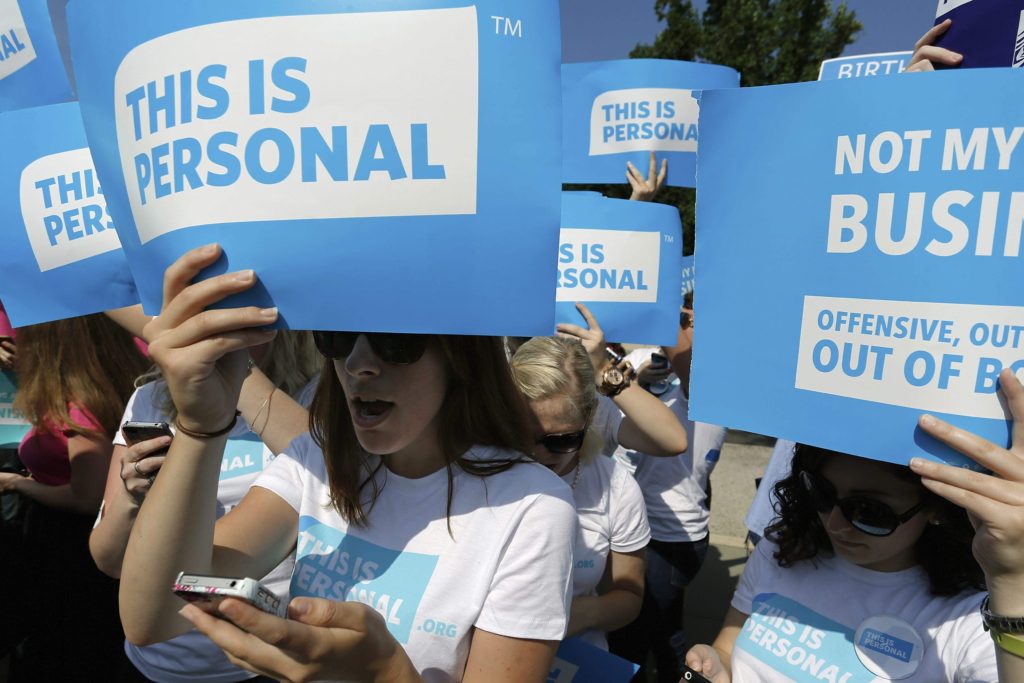Many will be erroneously celebrating the U.S. Supreme Court opinion handed down today in the Hobby Lobby contraception case as a further attempt by the courts to protect religious freedoms or innocent life. It does nothing of the sort.
The only “people” the opinion protects are the majority of American corporations. The only religious freedoms it protects are those with which a majority of Court justices agree.
The decision — a 5-4 split, saying “closely held corporations” cannot be required to provide contraception coverage for employees if the company has a religious objection — is not limited to the Hobby Lobby corporation. Based on Internal Revenue Service definitions, it will impact about 90 percent of all American businesses, and about 52 percent of the American workforce.
Perhaps it should not be surprising the Court that dubbed corporations the equivalent of persons has now decided that such entities are entitled to a religious belief system, but I’m still having difficulty with it. Apparently, so is Justice Ruth Bader Ginsburg.

As part of the dissent she noted that “religious organizations exist to foster the interests of persons subscribing to the same religious faith” and that “workers who sustain the operations of those corporations commonly are not drawn from one religious community.” Ginsburg added that this ruling allows such corporations to “deny legions of women who do not hold their employers’ beliefs access to contraceptive coverage.”
If today’s ruling could somehow be limited only to medications or contraception, it would be bad enough, but there are much broader implications at stake as to make this decision a fundamental shift in the judicial branch. Let’s let Ginsburg explain.
“Would the exemption the Court holds [the Religious Freedom Restoration Act] demands for employers with religiously grounded objections to the use of certain contraceptives extend to employers with religiously grounded objections to blood transfusions (Jehovah’s Witnesses); antidepressants (Scientologists); medications derived from pigs, including anesthesia, intravenous fluids, and pills coated with gelatin (certain Muslims, Jews and Hindus); and vaccinations (Christian Scientists, among others)? According to counsel for Hobby Lobby, “each one of these cases … would have to be evaluated on its own … apply[ing] the compelling interest-least restrictive alternative test. … Not much help there for the lower courts bound by today’s decision.
“The Court, however, sees nothing to worry about. Today’s cases, the Court concludes, are ‘concerned solely with the contraception mandate. Our decision should not be understood to hold that an insurance-coverage mandate must necessarily fall if it conflicts with an employer’s religious beliefs. Other coverage requirements, such as immunizations, may be supported by different interests (for example, the need to combat the spread of infectious diseases) and may involve different arguments about the least restrictive means of providing them.’ But the Court has assumed, for RFRA purposes, that the interest in women’s health and well being is compelling and has come up with no means adequate to serve that interest, the one motivating Congress to adopt the Women’s Health Amendment.
“There is overriding interest, I believe, in keeping the courts ‘out of the business of evaluating the relative merits of differing religious claims,’ or the sincerity with which an asserted religious belief is held. Indeed, approving some religious claims while deeming others unworthy of accommodation could be ‘perceived as favoring one religion over another,’ the very ‘risk the Establishment Clause was designed to preclude.’ The Court, I fear, has ventured into a minefield, by its immoderate reading of RFRA.”
The Establishment Clause was put in place not to keep religion out of politics or government, but to protect religion from politics and government. After all, no one wants government officials walking into their houses of worship and proclaiming this or that is frivolous or that a testament of faith is wrong. This holds true from fundamentalist to moderate congregations; what we believe or choose to believe is engraved within us and separate from the broader secular policies enacted by government and meant to better us all.
By that same token, we do not want or desire a government that would force such personally and staunchly held religious belief of one person on us all without there being an overriding and apparent common good. At least it appears this was what the government believed before this decision when the Court, in 1982, decided an employer who rejected to withholding Social Security taxes from his employees was a violation of his faith.
Today’s decision marks the first time in history, according to the Associated Press, the Court has said a profit-seeking business can have and use religious belief under federal law.
The silver lining in all of this must be that even before passage of the Affordable Care Act the vast majority of American employers — 85 percent, according to a Kaiser Family Foundation survey — valued and respected their employees enough to offer insurance coverage that included contraception. Unfortunately, it remains to be seen how thick or strong that lining is.
Nearly 50 businesses have sued either to prohibit their insurance plans from offering all forms of contraception, or to limit coverage to only those methods with which they agree. All the litigating corporations understood abortion, medical or chemical, was not a part of health care reform and, therefore, not part of what they were being asked to include in coverage.
Included in the eight preventive services for women under the healthcare reform law were screenings for intimate partner violence, well women visits, breastfeeding support and, of course, all contraceptive methods approved by the Food and Drug Administration.
This column by Lynda Waddington originally published in The Gazette on June 28, 2014. Photo credit: Jonathan Ernst/Reuters
